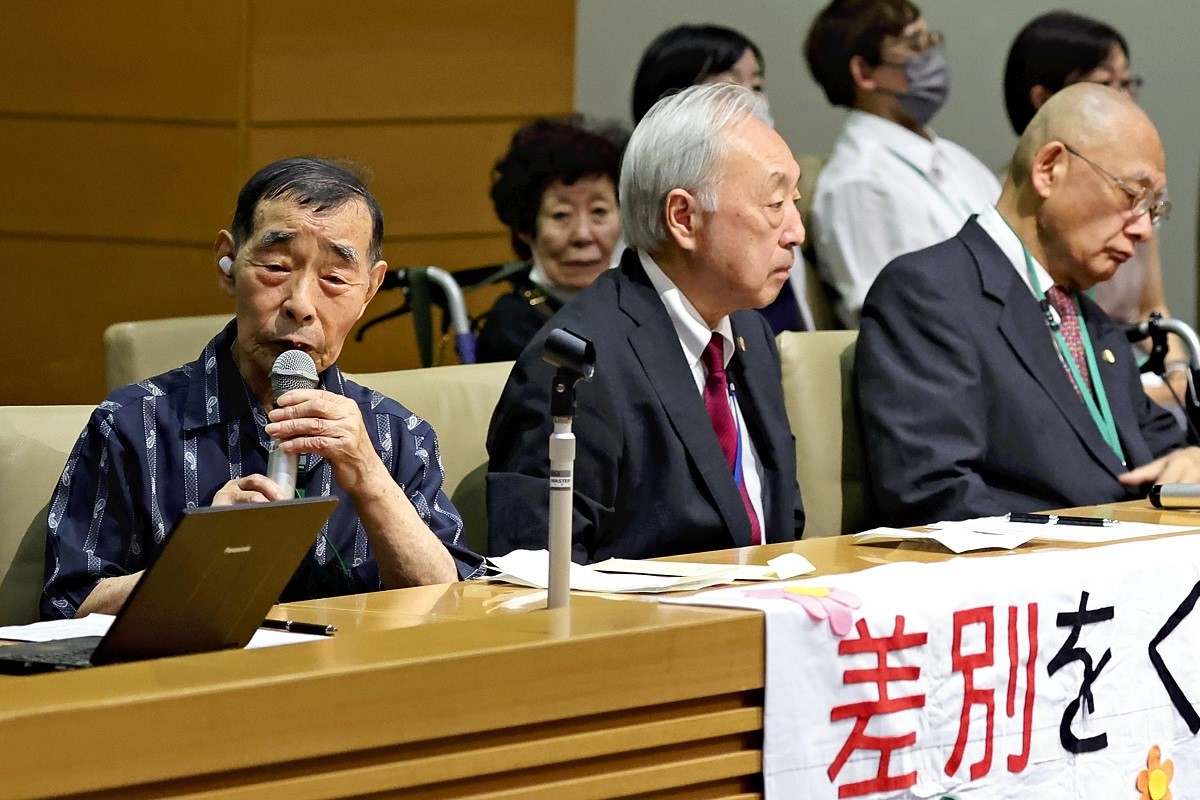‘Ray of Hope’ after Japan’s Supreme Court Rules on Forced Sterilization; Surgeries Declared Major Human Rights Violation

Saburo Kita, left, and other plaintiffs hold a press conference after the Supreme Court’s ruling in Chiyoda Ward, Tokyo, on Wednesday afternoon.
20:00 JST, July 4, 2024
When Chief Justice Saburo Tokura declared the plaintiffs’ victory at the Supreme Court soon after 3 p.m. Wednesday, cheers erupted from among the plaintiffs. “Yes!” shouted one.
Victims of forced sterilization shed tears of joy and saw “a ray of hope” after the court’s historic ruling against what has been called the “largest violation of human rights in the postwar period.”
Plaintiffs had sought compensation from the government for being sterilized under the defunct Eugenic Protection Law, and the top court ruled Wednesday that the law was unconstitutional. The court also offered scathing criticism of the government, which it said bore “an extremely grave responsibility for implementing a policy that imposed a heavy cost over a long period.”
Plaintiffs, who were unreasonably sterilized and denied the chance to have children and raise a family, were relieved at the ruling and hoped it would pave the way to a society without discrimination.
The Supreme Court clearly stated that the defunct law that was the foundation of state discrimination against disabled people was a “violation of the Constitution.” Tears welled in the eyes of an 81-year-old plaintiff who uses the pseudonym Saburo Kita and who had filed a lawsuit through the Tokyo courts.
Kita was forced to undergo surgical sterilization at age 14. He married at age 28 but could not bring himself to tell his wife about the operation during their more than 40 years together. He finally revealed the truth to his wife shortly before she died from illness. “Just make sure you eat proper meals, OK?” she told him with a gentle smile.
After his wife died, Kita launched a lawsuit seeking compensation in 2018. He doggedly went through the legal process, certain that his wife would have supported him if she were alive. After six years, Kita has achieved the legal victory he believes will lead to relief being provided to many fellow victims. In front of the Supreme Court, Kita raised a banner with a handwritten message: “Thank you for your support up to now.”
Kita intends to visit his wife’s grave to tell her about the ruling. “I can finally see a ray of hope,” Kita said. “I’m sure my wife would also be glad that we won.”
A long wait
Osaka case plaintiffs Taro Nomura and his wife Hanako, who both use aliases, shook the hands of supporters in Osaka after being informed of the ruling. Taro is in his 80s and Hanako is in her 70s both have hearing impairments and used sign language to tell reporters how they felt.
“We’ve been waiting for this result for a long time,” Nomura signed to reporters. “The sterilizations have finally been recognized as discrimination.”
The Nomuras got married in 1970 and had a daughter four years later, but she soon died. They hoped to have another child, but Hanako never got pregnant again. They later discovered that, without her knowing, Hanako had been surgically sterilized after she gave birth to their daughter. In the years that followed, seeing small children would stir up feelings of frustration and regret inside her.
On Wednesday morning, Hanako placed some flowers on the Buddhist alter for their daughter and said she hoped the court case would end in victory.
“We can’t change the past, but we can change what happens from now on,” Hanako signed. “I hope we become a society in which human rights violations like this never happen again.”
It was estimated that about 12,000 of the 25,000 people who underwent surgical sterilization under the law were still alive as of 2017. However, only 39 plaintiffs had filed lawsuits, and Wednesday’s ruling determined the state′s responsibility to pay compensation for just 12 of them. It is also believed that many victims remain unaware they were sterilized because they had surgery when they were children or because of the severity of their disability.
The victims are becoming increasingly elderly, so there is only limited time remaining for relief to be made available to them.
Top Articles in Society
-

Man Infected with Measles Reportedly Dined at Restaurant in Tokyo Station
-

Man Infected with Measles May Have Come in Contact with Many People in Tokyo, Went to Store, Restaurant Around When Symptoms Emerged
-

Woman with Measles Visited Hospital in Tokyo Multiple Times Before Being Diagnosed with Disease
-

Australian Woman Dies After Mishap on Ski Lift in Nagano Prefecture
-

Foreign Snowboarder in Serious Condition After Hanging in Midair from Chairlift in Nagano Prefecture
JN ACCESS RANKING
-

Japan PM Takaichi’s Cabinet Resigns en Masse
-

Japan Institute to Use Domestic Commercial Optical Lattice Clock to Set Japan Standard Time
-

Israeli Ambassador to Japan Speaks about Japan’s Role in the Reconstruction of Gaza
-

Man Infected with Measles Reportedly Dined at Restaurant in Tokyo Station
-

Videos Plagiarized, Reposted with False Subtitles Claiming ‘Ryukyu Belongs to China’; Anti-China False Information Also Posted in Japan





















